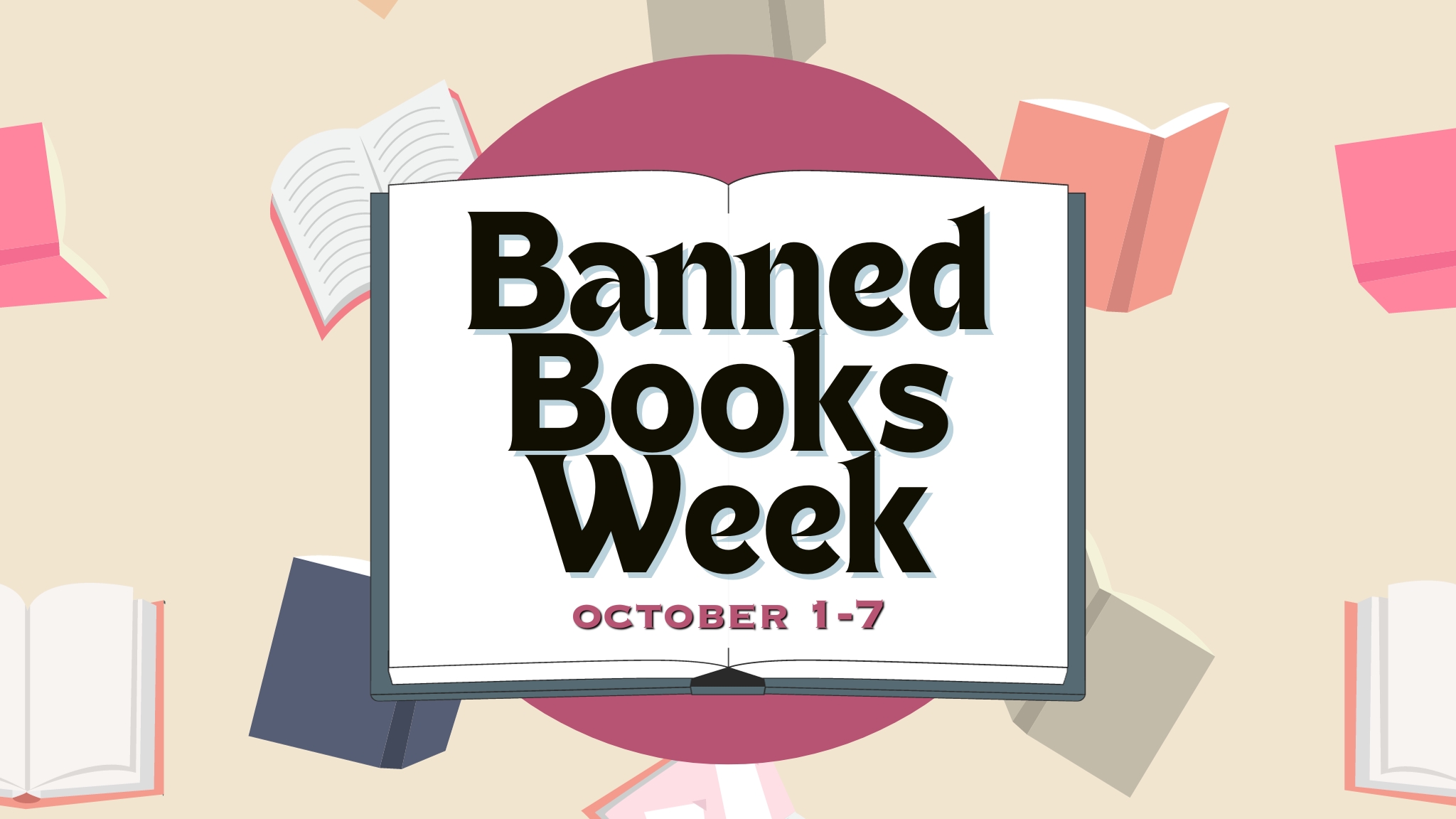Banned Books Week is underway, running from October 1 through October 7. The event highlights the value of free and open access to information and brings together the entire book community in shared support of the freedom to seek and express ideas.
With school book bans surging 33 percent over the past school year, according to PEN America’s recent Banned in the USA report, this year brings about a greater urgency to reverse a growing crisis that is fighting to erase ideas and topics from classrooms and libraries.
As attempts to challenge and ban books rose significantly, BookTrib’s staff considered the personal impact of several of these challenged titles. Whether remembered fondly from childhood, assigned in the classroom, or enjoyed in adulthood, the impact of these books is carried far beyond the last page. Reading is vital, fundamental and life-changing, and clearly, these books we’ve chosen are too.
Staff Picks
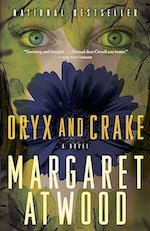 Jim’s Pick: Oryx and Crake by Margaret Atwood
Jim’s Pick: Oryx and Crake by Margaret Atwood
Yes, she’s plenty controversial, and she hits on themes and topics that would stun, yet the genius of Margaret Atwood is something that should never be stifled. With breathtaking command of her shocking material, and with her customary sharp wit and dark humor, the author takes us into an outlandish yet wholly believable dystopian realm so compelling, so prescient, so terrifyingly all too likely to be true.
JeriAnn’s Pick: Where The Wild Things Are by Maurice Sendak
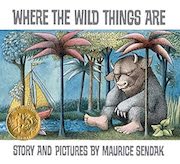 I first fell in love with this book in the second grade, and even then the book was being challenged for being “too dark” and having supernatural elements. But adult naysayers are missing the important work being done in Where the Wild Things Are.
I first fell in love with this book in the second grade, and even then the book was being challenged for being “too dark” and having supernatural elements. But adult naysayers are missing the important work being done in Where the Wild Things Are.
This is the tale of naughty Max who exacts his revenge when he’s sent to his room for bad behavior. To spite his mother, he sails off the edge of the world and becomes the King of the Wild Things. When you are small and powerless, what is more empowering than becoming the fiercest creature of all—the ruler of the bullies and beasts that inhabit your nightmares? But the joy doesn’t end there. When Max is done discovering how to escape into his imagination, he journeys home to realize he is still loved. Sendak’s illustrations make the adventure safe without making it tame. A masterpiece of children’s literature.
Megan’s Pick: The Giver by Lois Lowry
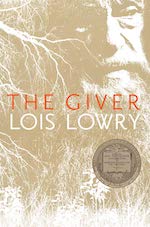 Every few years, I reread The Giver. This dystopian novel feels like the predecessor to the beloved, and also banned, dystopian books of the 2010s, such as The Hunger Games and Divergent. In The Giver — banned soon after its 1993 release — Jonas lives in a world that seems ideal, as it is free from pain, strife, hunger, war or any particularly strong feelings. Jobs and family units are assigned by the community. But when Jonas is assigned the role of Reciever, he is passed all of the memories of a long-forgotten past and soon begins to understand the dark, complex secrets behind his fragile community.
Every few years, I reread The Giver. This dystopian novel feels like the predecessor to the beloved, and also banned, dystopian books of the 2010s, such as The Hunger Games and Divergent. In The Giver — banned soon after its 1993 release — Jonas lives in a world that seems ideal, as it is free from pain, strife, hunger, war or any particularly strong feelings. Jobs and family units are assigned by the community. But when Jonas is assigned the role of Reciever, he is passed all of the memories of a long-forgotten past and soon begins to understand the dark, complex secrets behind his fragile community.
The Giver is a book about censorship itself, where a community decides what is right for everyone, stripping people of their individuality and literally pulling the color from life. It gets better with every re-read and should be read by everyone, middle-grade and adults alike.
Monique’s Pick: 1984 and Animal Farm by George Orwell
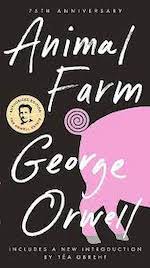
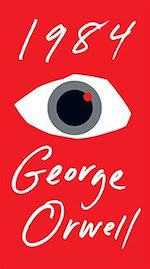 One of my favorite banned books is 1984 by George Orwell, which is a dystopian sci-fi tale warning humanity of what could happen if society regresses into a totalitarian state. What’s more, it explores the consequences of mass surveillance on society — something that’s no longer a far-fetched idea.
One of my favorite banned books is 1984 by George Orwell, which is a dystopian sci-fi tale warning humanity of what could happen if society regresses into a totalitarian state. What’s more, it explores the consequences of mass surveillance on society — something that’s no longer a far-fetched idea.
George Orwell also wrote Animal Farm, which is another book that lives rent-free in my mind. Animal Farm is an allegorical novella where farm animals rebel against the farmer in the hopes of creating a society where animals are equal, free and happy. Alas, as Orwell said: “All animals are equal, but some are more equal than others.” Both books were banned for their social and political themes in various parts of the world.
Cameron’s Pick: Persepolis: The Story of a Childhood by Marjane Satrapi
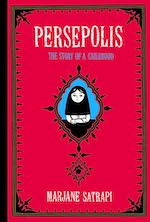 With stark black and white illustrations, Marjane Satrapi’s graphic memoir Persepolis: The Story of a Childhood chronicles her childhood in Tehran during the Islamic Revolution and the outbreak of the Iran-Iraq war. There are impactful moments of tragedy as the author loses friends and family members to the violence. But the book also chronicles daily life in Tehran during the late 70’s and early 80’s — the way Satrapi coveted her band posters and played pranks with her classmates.
With stark black and white illustrations, Marjane Satrapi’s graphic memoir Persepolis: The Story of a Childhood chronicles her childhood in Tehran during the Islamic Revolution and the outbreak of the Iran-Iraq war. There are impactful moments of tragedy as the author loses friends and family members to the violence. But the book also chronicles daily life in Tehran during the late 70’s and early 80’s — the way Satrapi coveted her band posters and played pranks with her classmates.
Persepolis has garnered praise and was even adapted into a César Award-winning film. But the book has also faced censorship all over the world, from Iran to the United States. With a Pennsylvanian school’s concerns about the language and violence in a scene depicting torture to a parent in Illinois asking “why a book about Muslims was assigned on September 11,” Persepolis is often on the ALA’s annual list of most banned books. But it’s this challenging material that drove Satrapi to create the memoir in the first place. And it’s her depiction of childhood — the same age group that is often kept from the book — that makes Persepolis such an impactful, unforgettable read.
Kelsey’s Pick: Beloved by Toni Morrison
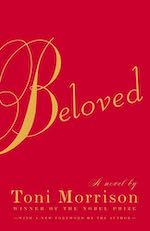 The late great Toni Morrison is a Pulitzer Prize-winning author and an American treasure, so why would her books be banned? Toni Morrison’s Beloved won the Pulitzer Prize in 1987 and is a story about Sethe, who was born into slavery and escaped to Ohio to find freedom. But she will never be free from the memories of the farm where so many horrible things happened. Not only is she haunted by her memories, but also by the ghost of her baby who died without a name, leaving behind a gravestone engraved with one word: Beloved.
The late great Toni Morrison is a Pulitzer Prize-winning author and an American treasure, so why would her books be banned? Toni Morrison’s Beloved won the Pulitzer Prize in 1987 and is a story about Sethe, who was born into slavery and escaped to Ohio to find freedom. But she will never be free from the memories of the farm where so many horrible things happened. Not only is she haunted by her memories, but also by the ghost of her baby who died without a name, leaving behind a gravestone engraved with one word: Beloved.
Given the current political climate, sadly it’s no surprise that this once critically acclaimed book has been banned due to “inappropriate and explicit” materials and ultimately its theme of dark moments in American history. Toni Morrison herself is quoted saying, “Efforts to censor, starve, regulate and annihilate us are clear signs that something important has taken place.”
Wyatt’s Pick: The Absolutely True Diary of a Part-Time Indian by Sherman Alexie
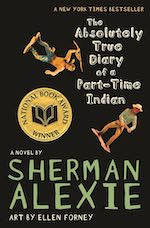 Budding cartoonist Junior lives on the Spokane Indian Reservation, and he leaves the rez to attend an all-white high school. The author Alexie drew from his own experiences for the novel, which addresses themes of racial identity, coming of age, bullying, violence, poverty, and more with Alexie’s characteristic humor.
Budding cartoonist Junior lives on the Spokane Indian Reservation, and he leaves the rez to attend an all-white high school. The author Alexie drew from his own experiences for the novel, which addresses themes of racial identity, coming of age, bullying, violence, poverty, and more with Alexie’s characteristic humor.
Unfortunately, the book’s accessibility to young children caused fear amongst over-anxious guardians of young innocence, leading to the book being challenged across the country. Hopefully, this book remains available to young readers everywhere, as there is nothing else quite like it on the market.
Barbara’s Pick: Charlotte’s Web by E.B. White
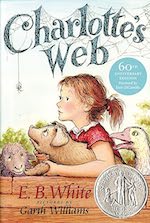 There are so many banned books that I love, but one of my favorites that really surprised me is Charlotte’s Web by E.B. White. This is a classic children’s story that I loved as a child and then read each year with my class when I taught 3rd Grade. Always a favorite! It’s a beautiful story about a pig named Wilbur and his friendship with a spider named Charlotte.
There are so many banned books that I love, but one of my favorites that really surprised me is Charlotte’s Web by E.B. White. This is a classic children’s story that I loved as a child and then read each year with my class when I taught 3rd Grade. Always a favorite! It’s a beautiful story about a pig named Wilbur and his friendship with a spider named Charlotte.
It was banned supposedly due to themes of death (Disney movies anyone??) and the fact that the main characters are talking animals (what??). In my opinion, this book should remain a classic. It teaches children about the true value of friendship and that’s an important lesson to learn.
Gerri’s Pick: The Handmaid’s Tale by Margaret Atwood
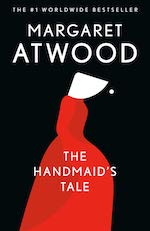 By far one of the most notable banned books, Margaret Atwood’s bestselling The Handmaid’s Tale is a classic dystopian story. As described by Reader’s Digest: A mysterious medical blight has rendered most women infertile. A group of patriarchal religious fanatics has overtaken New England. And at the crossroads are the handmaids—women taken hostage by the government because of their ability to have children. In The Handmaid’s Tale, one of the women tells her story. As Margaret Atwood herself wrote in an op-ed earlier this year, “To those who seek to stop young people from reading The Handmaid’s Tale: Good luck with that. It’ll only make them want to read it more.”
By far one of the most notable banned books, Margaret Atwood’s bestselling The Handmaid’s Tale is a classic dystopian story. As described by Reader’s Digest: A mysterious medical blight has rendered most women infertile. A group of patriarchal religious fanatics has overtaken New England. And at the crossroads are the handmaids—women taken hostage by the government because of their ability to have children. In The Handmaid’s Tale, one of the women tells her story. As Margaret Atwood herself wrote in an op-ed earlier this year, “To those who seek to stop young people from reading The Handmaid’s Tale: Good luck with that. It’ll only make them want to read it more.”
Natalie’s Pick: One Flew Over the Cuckoo’s Nest by Ken Kesey
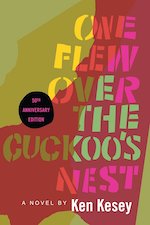 The novel explores the human psyche and group behavior, taking place in a mental institution during the 1960s. It contains complex themes such as freedom, power, hierarchy, and mental illness, as well as a more discrete element of friendship, which was emphasized in the 1975 film adaptation starring Jack Nicholson and Will Sampson.
The novel explores the human psyche and group behavior, taking place in a mental institution during the 1960s. It contains complex themes such as freedom, power, hierarchy, and mental illness, as well as a more discrete element of friendship, which was emphasized in the 1975 film adaptation starring Jack Nicholson and Will Sampson.
This novel was challenged and banned from schools several times throughout the 1970s and 80s for reasons such as the novel being “pornographic” and “glorifying criminal activity”. In 2000, one parent at Placentia-Yorba Linda Unified School District feared the book “teaches how very easy it is to smother somebody. I don’t want to put these kinds of images in children’s minds. They’re going to think that when they get mad at their parents, they can just ax them out.” Read more.

